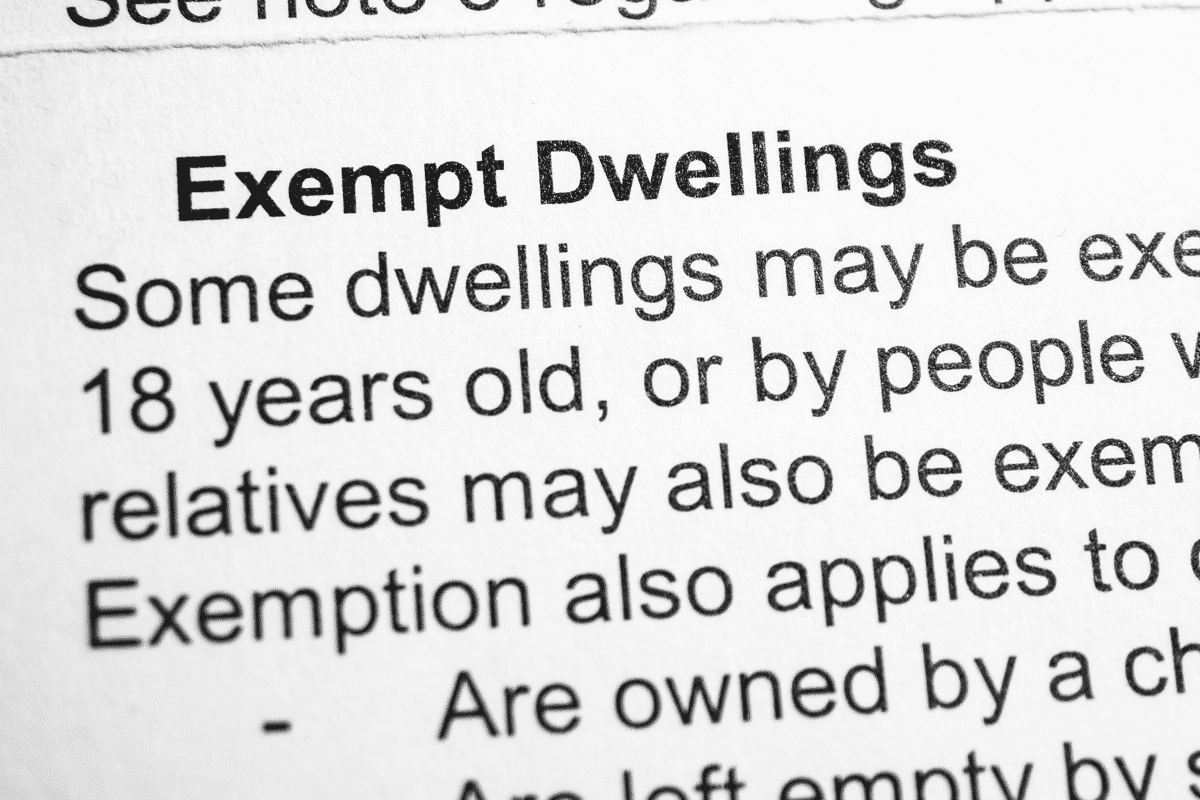When Can You Claim a Council Tax Exemption?
You have to pay Council Tax for any property you live in whether you own it or rent it in most cases. There are many different ways in which you could claim a Council Tax exemption or discount however. Here are the ways in which you can be exempt from paying some or all of your Council Tax.
Quick Links
- What is Council Tax?
- Who Has to Pay Council Tax?
- Council Tax Exemptions and Discounts
- Properties Where Residents are Disregarded for Council Tax
- Occupied by Full-Time Students
- Occupied by Disabled People
- Second Homes and Holiday Homes
- Annexes
- Empty Homes
- Property Under Probate
- Occupied by Prisoners
- Diplomats, Visiting Forces and International Organisations
- Hospital and Care Home Residents
- Repossessed Property
- Derelict Properties
- Properties subject to Compulsory Purchase
- Properties Undergoing Repairs and Structural Work
- Council Tax Support
- Single Person Discount
- How to Claim a Council Tax Exemption
What is Council Tax?
Council Tax is a tax levied by local government to fund the provision of local services including education, social care, refuse collection and roads amongst other things.
Every residential property is put into a Council Tax valuation band based broadly on its value. The eight Council Tax bands run from A for the cheapest property to H for the most expensive. Wales has nine bands from A-I.
Council Tax applies across the country. The annual amount payable for a property in each band is decided by local councils, however.
Local councils also have discretion as to what Council Tax exemptions or discounts to give so they are not exactly the same in all areas.

Access our selection of exclusive, high-yielding, off-market property deals and a personal consultant to guide you through your options.
Who Has to Pay Council Tax?
You’ll usually have to pay Council Tax if you’re an adult aged 18 or over and own or rent a property. A couple living together are usually both liable for the bill and in some cases, other residents can be liable too.
If a property is rented it is usually the tenant who pays the Council Tax otherwise the owner is liable.
If the property is a shared house or HMO is it usually the owner or landlord who is liable for the Council Tax and not the tenants.
Council Tax Exemptions and Discounts
You can get a Council Tax exemption or discount in certain circumstances depending either on the property itself or who is living there. You can get an exemption or discount either because the property is exempt or because some or all of the residents are not counted for Council Tax.
Here are the main ways in which you could be entitled to exemption from paying Council Tax:

Properties Where Residents are Disregarded for Council Tax
Children under 18 are not counted for Council Tax purposes. In some cases, those over 18 might not be counted as an adult for Council Tax purposes and in these cases, a Council Tax reduction can be claimed. In some cases, this might mean that the property may be exempt from Council Tax entirely.
Those who are disregarded for Council Tax purposes include:
- Full-time students
- 18 and 19-year-olds in full-time education
- Student nurses
- Those on certain qualifying apprenticeship schemes
- Those under 25, in receipt of funding from the Education and Skills Funding Agency
- Members of religious communities, eg. monks and nuns
- Foreign language assistants registered with the British Council
- People with a severe mental impairment
- Live-in carers who look after someone who is not their partner, spouse or child under 18
- Diplomats and those with diplomatic immunity
If no one in a property counts for Council Tax purposes as above and it is not completely exempt a 50% exemption from Council Tax can be claimed.
Occupied by Full-Time Students
If everyone who lives in a property is a full-time student it is exempt from Council Tax.
To count as a full-time student the course must last at least one year and involve at least 21 hours of study per week. Properties occupied by students on a course that is not a higher education course but which lasts for more than three months and involves more than 12 hours of study a week are also exempt if the students are under the age of 20.
Occupied by Disabled People
People who are severely mentally impaired are not included when working out Council Tax. There is also a Council Tax discount for people who have a condition that affects the brain including dementia.
Live-in carers are also not included where they are looking after someone who is not their partner, spouse, or child under 18.
Those who live in a larger property than they would need if they or another occupant were not disabled may be eligible for the Disabled Band Reduction Scheme.
Second Homes and Holiday Homes
Most councils no longer give a discount for holiday homes or second homes.
If you run a holiday home like a business and rent it out for holiday lets you may be able to claim a complete exemption from Council Tax and pay business rates instead. Some types of businesses can claim business rates relief and pay no business rates.
If you have more than one home because you have been provided with accommodation somewhere else by your employer you may be able to get a Council Tax discount of 50%.
Annexes
An annexe to a property that is normally subject to its own Council Tax bill may qualify for a discount or exemption, in some cases. For example, if the occupant is a relative or dependant.
Empty Homes
If your property is empty local councils are able to offer exemption from Council Tax. Many do not offer this type of Council Tax exemption, however.
Be aware that if your property is empty long term (over a year) it may be subject to a Council Tax surcharge of 100%, 200% or even 300% in some cases.
Property Under Probate
If you have probate on a property owned by someone who has died it may be exempt from Council Tax for up to six months.
Occupied by Prisoners
Properties normally occupied by those in prison are exempt from Council Tax except it if is for non-payment of Council Tax or a fine for not paying it.
Diplomats, Visiting Forces and International Organisations
A property may be exempt if at least one person who would normally be responsible for the Council Tax is a diplomat or member of a visiting force or certain international organisations.
UK armed forces personnel serving overseas are not exempt from Council Tax but may receive Council Tax Relief.
Hospital and Care Home Residents
Those who are in a hospital or care home on a long term basis are exempt from Council Tax on their property. Some other types of residential accommodation may also qualify for Council Tax exemption.
Derelict Properties
If a property is derelict, and/or if it cannot be lived in by law, it is exempt from Council Tax.
Properties subject to Compulsory Purchase
Properties that have been compulsorily purchased are exempt from Council Tax.
Properties Undergoing Repairs and Structural Work
If your property is undergoing structural work or major repairs it may be exempt from Council Tax.
Council Tax Support
If you are on a low income or claim benefits you may be able to claim Council Tax Reduction or Council Tax Support depending on your financial circumstances. Council Tax Reduction has replaced Council Tax Benefit.
Pensioners who receive Pension Credit may receive a full or part Council Tax discount.
Council Tax Support can be equivalent to a 100% exemption from Council Tax in some cases.
Single Person Discount
If only one adult lives in a property they can claim the Single Person’s Discount or reduction of 25%. This is in effect a partial exemption from Council Tax.
How to Claim a Council Tax Exemption
You can claim a Council Tax exemption or reduction by contacting the Council Tax department of the local council where your property is located.
You can find out which local council covers an area, here.
You can usually claim a Council Tax reduction or exemption by phone, online or by filling in a paper form depending on the council and the kind of exemption you are claiming. You may need to provide evidence to support your claim.
Councils must make a decision on your claim for Council Tax exemption or discount within two months. If you disagree with their decision you can appeal through the Valuation Tribunal Service.
It is advisable to double-check that you are eligible before claiming your Council Tax exemption. Be aware that local councils have discretionary powers to vary the circumstances under which they give Council Tax exemptions. Council Tax exemptions that are available in one council area may not be available in another.
There are also differences to Council Tax exemptions in Scotland.
Northern Ireland has Domestic Rates instead of Council Tax. There are a number of ways in which discounts or exemptions can be given from rates including rates rebates in Northern Ireland.
